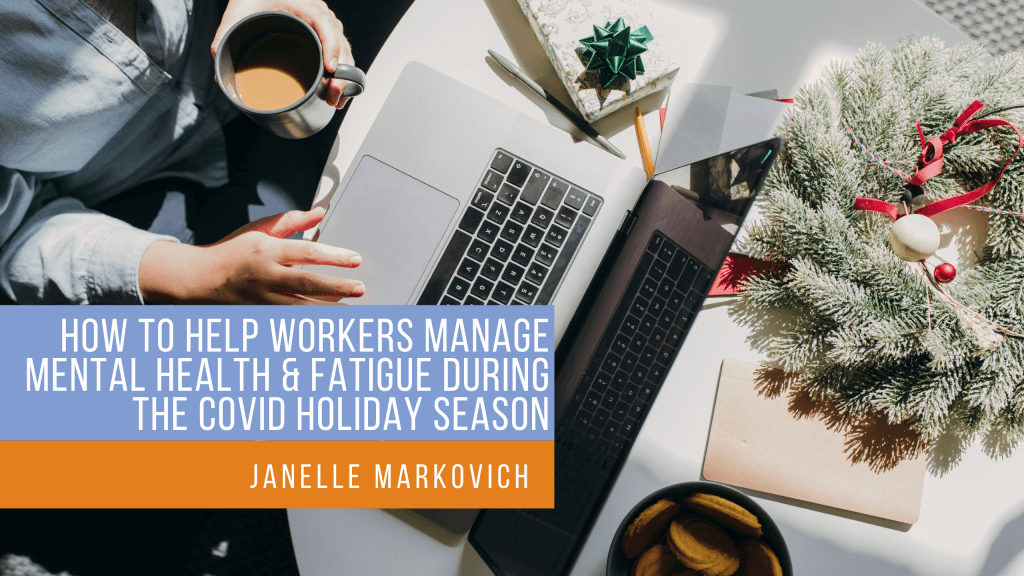Propel provides innovative insurance solutions to thousands of companies across the country. We make it our business to know your world inside and out.
Producer's Corner
How to Help Workers Manage Mental Health & Fatigue During the COVID Holiday Season
Even if they don’t say anything about it, your workers are probably going through a tough time right now. They’re still employed, but their spouses might not be, and the impact on the family budget could be causing financial stress.
Virtual learning has also put additional pressure on parents who suddenly have to supervise lessons. There’s also the stress caused by worrying about the virus and not being able to see friends and family.
Add it all together, throw in the usual holiday stress on top of everything else, and you’ve got the recipe for a potential workplace disaster.
COVID-19 and Mental Health
Numerous figures show that the pandemic has had a substantial and negative impact on mental health.
- In late June, 40% of U.S. adults said they were struggling with mental health or substance abuse, according to the CDC. 11% said they had seriously considered suicide and 13% said they had started or increased substance use.
- The American Psychological Association’s Stress in America poll found that reported stress levels increased during the pandemic and were especially high for parents, with about half of parents reporting high stress levels.
- Drug and alcohol use may have increased. Alcohol sales spiked 27% between March and June, according to CNN and based on a report from Nielsen. The American Medical Association also reported an increase in drug-related overdoses.
Impact on Work
According to the American Institute of Stress, chronic stress can cause irritability, anxiety, depression, headaches and insomnia. People who suffer from stress may become forgetful or have difficulty making decisions. They may also be involved in more minor accidents, and their productivity may decrease.
These issues can be especially dangerous in fields like construction, where one moment of distraction can result in injury or death. Workers who attempt to relieve their stress with drugs or alcohol may also end up contributing to a serious workplace incident.
Tips and Resources to Help Your Workers
The pandemic will end eventually, but in the meantime, we’re facing a difficult holiday season. Make sure your workers know they are not alone and help them feel like they have an advocate. Here are some tips to keep in mind:
- Take time to personally reach out to workers and engage with them. Ask them how things are going, listen to what they say, and respond with empathy. Supervisors should strive to have a one-one conversation with every employee weekly, if possible.
- Find ways to connect as a group. The regular holiday parties are being canceled, but people can still get together for video calls. Consider hosting a weekly breakfast, lunch or Happy Hour check-in with your team via Zoom.
- During meetings, allow time to acknowledge stress and share feelings. Go around the virtual room and let each person rate their current stress level. Keep it light, positive and supportive. Let people share as much as they are comfortable, but don’t force anyone to share. The goal is to make people know that they are not alone.
- Consider remote wellness strategies. Host yoga or meditation classes over Zoom. Encourage team members to do Peloton rides together. Start a wellness campaign to promote more steps, in which employees can compete or earn rewards remotely. Invite health care experts to educate your team during virtual brown bag lunches.
- Create a weekly mental health tips email, in which you share resources from the National Institute of Mental Health, ManTherapy, The Construction Industry Alliance for Suicide Prevention and more.
- Encourage your team to use mental health apps to manage stress, meditate and sleep well. The American Institute of Stress has a list of apps to consider. Consider providing apps to employees as a wellness benefit.
- Educate team members to use the benefits available to them. If you have an Employee Assistance Program, make sure your team is aware of it. Also, let them know if your group benefits cover telehealth counseling.
By raising awareness of mental health, and facilitating stronger social connections within your workplace, you can help your team stay healthy.

Janelle Markovich
As the daughter of a well-established insurance professional and agency owner, it was natural for Janelle to join the industry. Now 25 years in and counting, she still loves what she does every day, particularly helping her clients achieve their business goals.More about Janelle...


